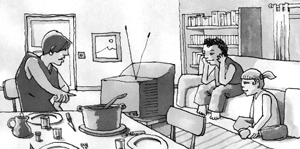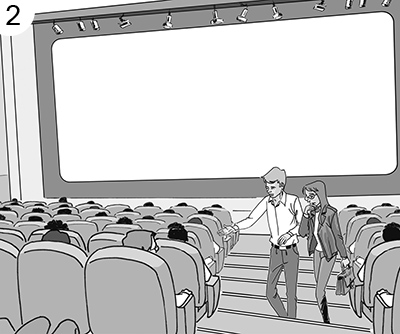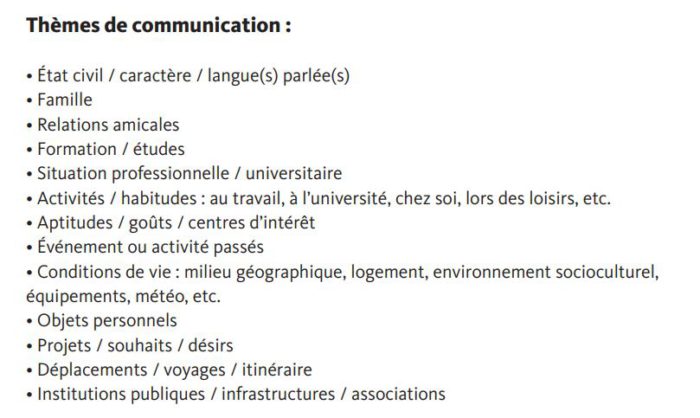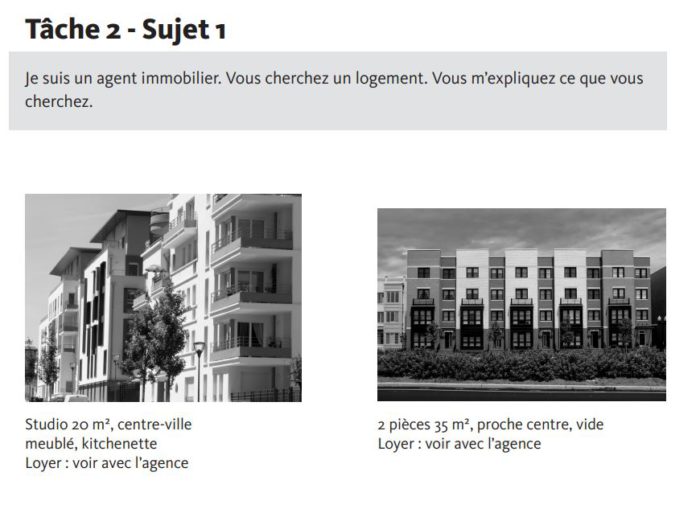Practice for the TCF
Choose a series and answer the questions without time limit to progress at your own pace, or practice grammar or comprehension questions directly.
Test in real conditions
Do you feel ready? Take a test under real TCF conditions and evaluate your results. Take the test as many times as you like, it’s free.
In order to best prepare you for the TCF, we provide you with a 90-minute test which combines the same conditions as during an official session. Please note that the results obtained do not guarantee the same level at the official TCF, but it is the ideal training to pass your exam.
Further information
TCF: a certification from France Éducation international
Попробовать пройти тест можно :
- на сайте TV5 Monde здесь
Более подробную информацию о TCF IRN , TCF Québec, TCF TP и TCF Canada можно найти в:
ДАТЫ ЭКЗАМЕНА И ДАТЫ ЗАПИСИ
| ЭКЗАМЕН | ДАТЫ ЗАПИСИ | ДАТЫ ЭКЗАМЕНА |
| TCF TP на компьютере | 15 — 22/03/2023 | 28/03/2023 |
| TCF IRN на компьютере | 20 — 24/03/2023 | 29/03/2023 |
| TCF CA на компьютере | 20 — 24/03/2023 | 31/03/2023 |
СТОИМОСТЬ ЭКЗАМЕНА
| ЭКЗАМЕН | ЧАСТИ ЭКЗАМЕНА | СТОИМОСТЬ (рубль) |
| TCF Québec (иммиграция в Квебек) | compréhension orale (CO) | 5 500 |
| TCF Québec (иммиграция в Квебек) | compréhension écrite (CE) | 5 500 |
| TCF Québec (иммиграция в Квебек) | expression orale (EO) | 5 500 |
| TCF Québec (иммиграция в Квебек) | expression écrite (EE) | 5 500 |
| TCF IRN (получение французских документов) | CO + CE + EE + ЕО | 15 500 |
| TCF для всех (обязательная часть) | CO + MSL + CE | 10 000 |
| TCF для всех (устный экзамен) | expression orale (EO) | 5 000 |
| TCF для всех (письменный экзамен) | expression écrite (EE) | 5 000 |
| TCF Canada (иммиграция в Канаду) | CO + CE + EE + ЕО | 20 000 |
Результаты TCF отправляются в электронном виде на почту кандидата.
Compréhension orale
Exemple 1
Consigne : Écoutez les 4 propositions. Choisissez celle qui correspond à l’image et cochez une case sur la feuille de réponses.
| Sur le livret, vous voyez : |
|
|
|---|---|---|
| Vous entendez : | A. Allez vous coucher rapidement. B. Finissez vos exercices de français. C. Regardez la télévision maintenant. D. Venez manger tout de suite. |
|
| Cochez la bonne réponse : |
A B C D |
Exemple 2
Consigne : Écoutez les 4 propositions. Choisissez celle qui correspond à l’image et cochez une case sur la feuille de réponses.
| Sur le livret, vous voyez : |
|
|
|---|---|---|
| Vous entendez : |
A. C’est un acteur formidable. |
|
| Cochez la bonne réponse : |
A B C D |
Exemple 3
Consigne : Écoutez la question et les 4 réponses. Choisissez la réponse qui correspond à la question et cochez une case sur la feuille de réponses.
| Vous entendez : |
Qu’est-ce que vous prenez au petit déjeuner ? |
|
|---|---|---|
| Cochez la bonne réponse : |
A B C D |
Exemple 4
Consigne : Écoutez la question et les 4 réponses. Choisissez la réponse qui correspond le mieux à la question et cochez une case sur la feuille de réponses.
| Vous entendez : |
Pardon, Mademoiselle, à combien est la robe rouge, celle-là, là-bas ? |
|
|---|---|---|
| Cochez la bonne réponse : |
A B C D |
Exemple 5
Consigne : Écoutez le document sonore et la question. Choisissez la bonne réponse et cochez une case sur la feuille de réponses.
| Vous entendez un document sonore : | — Vous réglez comment ? — Par chèque. — Je suis désolé, mais nous ne les acceptons plus. Cependant, nous acceptons toutes les cartes bancaires et les règlements en espèces. — Oui, mais j’ai laissé ma carte à la maison et je n’ai pas assez de liquide. — Bon, d’accord, mais c’est vraiment exceptionnel ! |
|
|---|---|---|
| Vous entendez une question : | Comment le client va-t-il payer ses achats ? | |
| Sur le livret, vous lisez 4 choix de réponse : | A. En espèces. B. Par chèque. C. Par carte de crédit. D. Par carte bancaire. |
|
| Cochez la bonne réponse : |
A B C D |
Exemple 6
Consigne : Écoutez le document sonore et la question. Choisissez la bonne réponse et cochez une case sur la feuille de réponses.
| Vous entendez un document sonore : |
— David, pourriez-vous appeler Monsieur Schmit ? J’ai besoin de son avis rapidement. |
|
|---|---|---|
| Vous entendez une question : | Que doit faire David ? | |
| Sur le livret, vous lisez 4 choix de réponse : |
A. Annuler une réunion de travail. |
|
| Cochez une case sur la feuille de réponses |
A B C D |
Exemple 7
Consigne : Écoutez le document sonore et la question. Choisissez la bonne réponse et cochez une case sur la feuille de réponses.
| Vous entendez : |
Si vous êtes une entreprise ou un organisme public, vous pouvez, grâce à cet organisme spécialisé dans les relations internationales, bénéficier d’une étude géopolitique détaillée complète et d’un travail d’expertise. Ils prennent en compte les aspects à la fois politiques, sociaux et économiques et leurs études très approfondies sont menées par des experts reconnus. Vous pouvez faire appel à eux, par exemple, si votre organisation désire connaître la région dans laquelle elle envisage de s’implanter ou avec laquelle elle voudrait nouer des liens. À titre d’exemple, il est important de connaître le degré d’ouverture économique d’un pays au commerce international ou bien d’avoir une idée précise des investissements étrangers dans ce même pays. Vous avez donc toutes les données du contexte géopolitique et ses conséquences potentielles sur votre secteur d’activité. Quel est le rôle de l’organisme présenté ? |
|
|---|---|---|
| Sur le livret, vous lisez : |
A. Contribuer à la recherche sur les questions stratégiques. |
|
| Cochez la bonne réponse sur la feuille de réponses : |
A B C D |
Пробные варианты Экзамена DELF, DALF, TCF, DILF и TEF
Ниже у вас есть возможность ознакомиться со всеми типами экзаменов по французскому иностраному языку. (FLE)
Чтобы лучше подготовиться к экзаменам по французскому иностраному языку (FLE) мы сгруппировали большое количество предметов для каждого типа экзамена (DELF, DALF, TCF etc…) чтобы помочь вам в подготовке.
После того, как вы выберете нужный вам экзамен, вы попадёте на страницу ,где можете выбрать более подходящий уровень для вас.
DILF📃
DELF📃
DALF📃
TCF📃
TEF📃
DELF Prim📃
TCF (Test de connaissance du francais) — экзамен оценивает уровень владения общим французским языком, предназначен для иностранцев, изучающих французский язык. Экзамен одобрен Министерством Образования Франции.
Не сдать экзамен невозможно: все кандидаты получают сертификат, присваивающий им один из шести уровней знания языка (от А1 до С2 – по международной системе уровней). Например, при запросе стипендии во Франции необходим уровень В2/С1. Существует электронная версия экзамена, ее можно сдавать на компьютере.
Существует несколько вариантов экзамена:
— общий TCF;
— TCF для студентов (нужен для получения образования в вузах Франции);
— TCF для гос.служащих и TCF для тех, кто обращается за видом на жительства в Квебеке (с 2006 года этот сертификат обязателен для иммигрирующих в Квебек).
Результаты экзамена действительны в течение 2 лет.
Для подготовки к экзамену, мы рекомендуем занятия с репетиторами онлайн у себя дома! Все выгоды очевидны! Пробный урок бесплатно!
Желаем Вам успешной сдачи экзамена!
перейти на страницу «Международные экзамены по французскому» >>>
Если Вам понравилось — поделитесь с друзьями :
Присоединяйтесь к нам в Facebook!
Изучение разговорного французского — Real Language Club
Смотрите также:
- Французские тексты с аудио
- Диалоги на французском
- Топики по французскому с переводом
- Подготовка к ЕГЭ по французскому
- Видео на французском с субтитрами
- Основные фразы на французском
- Французские сленговые выражения
- Упражнения на произношение французского
- Французские скороговорки
- Анекдоты на французском с переводом на русский
- Стихи на французском с переводом и аудио
Мы рекомендуем:
- Лучшие репетиторы по французскому
Самое необходимое из теории:
- Грамматика французского языка
Предлагаем пройти тесты онлайн:
- Тест на уровень владения французским
- Тест по лексике французского
- Тесты по грамматике французского
- Какой язык учить?
Рекомендуемые статьи и видео:
- Как успешно пройти собеседование на французском
- Интересные тесты: узнайте свой уровень владения языком
- Гимнастика для лингвистов: комплекс для правильного произношения
- 5 правил успешного изучения языка
- Как улучшить знание иностранного языка: три совета и пять правил
- Как улучшить беглость речи
- Видео: «Как улучшить произношение и понимание»
Ещё статьи >>>
Курсы английского языка по уровням
Beginner
Экспресс-курс
«I LOVE ENGLISH»
Elementary
Космический квест
«БЫСТРЫЙ СТАРТ»
Intermediate
Обычная жизнь
КЕВИНА БРАУНА
В разработке
Advanced
Продвинутый курс
«ПРОРЫВ»
Практичные советы по изучению французского языка
Как успешно пройти собеседование на французском
Как улучшить беглость речи
Как улучшить произношение и понимание
5 правил успешного изучения языка
Как улучшить знание иностранного языка: три совета и пять правил
Все советы
TCF IRN (Test de connaissance du français Intégration, Résidence et Nationalité)
Экзамен для тех, кто подает на французское гражданство, карту резидента или просто хочет узнать свой уровень владения языком. Этот экзамен выявляет только языковые умения и не оценивает знания в истории, культуре и социальной жизни Франции.
Претендующие на получение французского гражданства должны подтвердить свои знания на уровне не ниже В1; на карту резидента – не ниже А2.
Экзамен состоит из 4 частей (общее время прохождения – 1 ч. 15 м.):
- Понимание устной речи (аудирование): 20 вопросов с множественным выбором ответа (4 ответа на выбор, только один правильный); 15 минут.
- Понимание письменной речи: 20 вопросов с множественным выбором ответа (4 ответа на выбор, только один правильный); 20 минут.
- Письменное задание: 3 упражнения; 30 минут.
- Устное задание: 3 упражнения в паре с экзаменатором; 10 минут.
Общие рекомендации: делать задания друг за другом, не перескакивая. Если тест проходит на компьютере, заранее познакомиться с французской раскладкой клавиатуры.
Аудирование
Оценивается способность понимать
- разговорную французскую речь, например, слова и фразы, обычные в повседневной жизни (бытовых диалогах, интервью, собеседованиях, телефонных разговорах и т.п.);
- основное в простых и четких сообщениях и объявлениях;
- информацию о людях, событиях, фактах в радио и телепрограммах, новостях;
- личную и профессиональную информацию;
- высказывания на конкретные или абстрактные темы;
- любые разговоры из обычной жизни.
Каждая аудиозапись проигрывается только один раз. Вопрос задается после прослушивания аудиодокумента. Записи идут в порядке усложнения.
Понимание письменной речи
Эта часть тестирует способности понимать на письме:
- привычные слова и фразы, используемые в ситуациях общения (дружеские и административные сообщения и письма);
- информацию, содержащуюся в распространенных документах (объявлениях, проспектах, меню, расписаниях);
- информацию о людях, фактах, событиях (в личных письмах);
- тексты, относящиеся к повседневной жизни или работе;
- статьи и отчеты, в которых автор высказывает свое отношение;
- длинные и сложные фактологические или литературные тексты, специализированные статьи;
- сложные и абстрактные отрывки из произведений, специализированных статей.
Задания идут от простого к сложному.
Письменное задание
Состоит из 3 частей.
Часть 1 – описание человека, группы людей, места, предмета в коротком личном сообщении в ответ на вопрос, поставленный в коротком сообщении. Количество слов – 30-60.
Часть 2 – рассказ о повседневной жизни, о полученном опыте. Количество слов – 40-90.
Часть 3 – высказывание своего мнения о месте, предмете, лице, группе лиц. Количество слов – 40-90.
При подсчете слов ориентируются на следующее правило: слово окружено пробелами. Поэтому un bon sujet – это 3 слова; с’est-à-dire — 1 слово.
Тестируемый должен уметь:
- Строить ясные высказывания.
- Предоставлять запрашиваемую информацию.
- Описывать, рассказывать, объяснять.
- Обосновывать свой выбор, свою позицию, решение.
- Связывать идеи, быть последовательным в своем изложении.
- Выражать свое мнение и аргументировать.
- Использовать лексику и структуры, подходящие к поставленной задаче.
Пример письменного задания.
Устное задание
Состоит из 3 частей общей продолжительностью в 10 минут. Без подготовки. Часть 1 – собеседование. Ответы на вопросы экзаменатора (3 минуты). Тестируемый должен показать умение обмениваться информацией с незнакомым человеком. Примерные темы:
Часть 2 – диалог с экзаменатором на бытовые темы (3,5 минуты). Тестируемый должен показать умение получить информацию в ситуации повседневной жизни. Здесь разыгрывается сценка в рамках описанного задания, экзаменатор и тестируемый играют свои роли. Например:
Часть 3
Монолог с оценочными суждениями (3,5 минуты). Тестируемый должен показать умение говорить связно достаточно долго и без подготовки, а также отвечать на вопросы. Экзаменатор предлагает тему для высказывания. Например:
В устной части оцениваются умения:
- Рассказать о себе, своем окружении, семье, профессии;
- Задавать вопросы в соответствии с ситуацией;
- Высказывать свое мнение и объяснять преимущества и недостатки, выражать свое согласие и несогласие;
- Ясно и структурно аргументировать в стиле, подходящем к ситуации;
- Подробно рассказывать о сложных вещах, развивать свои мысли и делать заключения.
Описание теста на официальном сайте France Elucation Internationale

By
Last updated:
December 23, 2022
Why the TCF Is the French Test You’ve Been Looking For (and How to Prepare for It)
Language learners tend to miscalculate their skill level.
I thought my French was much better than it really was…before I went to France for the first time.
Luckily, there’s a way to objectively test your skills in every aspect of the French language: the TCF!
Contents
- Enter the TCF (Test de connaissance du français)
- Why Take the TCF?
-
- It lets you know your strengths and weaknesses
- Employers may require it
- The TCF may be needed to study at Francophone universities
- Governments use it when screening potential immigrants
- What Is Tested (and How to Study)
-
- Listening
- Proficiency in language structures
- Reading
- Optional subjects
-
- Speaking
- Writing
- How Is the TCF Scored?
- Different Varieties of the TCF
-
- TCF
- TCF for Quebec
- Taking the TCF on a computer
- Tips for Test Day
-
- Show up early, and remember essential items
- Listen to/read the instructions carefully
Download:
This blog post is available as a convenient and portable PDF that you
can take anywhere.
Click here to get a copy. (Download)
Enter the TCF (Test de connaissance du français)
The Test de connaissance du français, or TCF, is a French knowledge test administered by the Centre international d’études pédagogiques, or CIEP, an institution linked to the French education ministry.
Unlike the Diplôme d’études en langue française (DELF) or the Diplôme approfondi de langue française (DALF), the TCF leads to a certificate, not a diploma, meaning that its validity is temporary.
Furthermore, the DELF/DALF focus on listening, reading, writing and speaking, whereas the TCF tests listening, language structures and reading, with writing and speaking as optional components, as explained below.
It lets you know your strengths and weaknesses
By taking the TCF, you’ll see where your strengths lie and where you need more work, since each section tests a different skill. When I took it for the first time, I realized that I understood spoken French pretty well, but that I needed to improve my knowledge of French grammar, giving me direction for furthering my studies.
Employers may require it
If applying for a job that includes speaking French—say translation, international sales, NGO, the list goes on—your employer may want to confirm the skills you claim to have on your resume.
The TCF may be needed to study at Francophone universities
Many universities use the TCF to verify that applicants have sufficient language skills to pursue their studies. Usually, the minimum accepted score is in the “intermediate” range, which, if you speak French well enough to consider studying in a French-speaking country, should be completely attainable.
Governments use it when screening potential immigrants
In Quebec, potential immigrants can take the Quebec version of the TCF to prove that they speak French.
Similarly, anyone interested in becoming a naturalized French citizen can validate their skills with the TCF – ANF (TCF pour l’accès à la nationalité française).
What Is Tested (and How to Study)
The exact sections on the test will vary according to which version you take and what optional sections you might choose, but the main version of the TCF includes three required subjects: listening, proficiency in language structures and reading.
Understanding the basics of the test is great, but so far I haven’t described anything that you couldn’t have learned with a little online research on your own. After all, you want to know how to attain the best score possible! How do you study for a test that encompasses so many subjects? Everyone has different study habits, but I’ll elaborate on some study methods that worked for me.
Listening
Oral comprehension is broken up into several sub-sections. Section 1 tests understanding of how audio clips relate to a given image. Section 2 tests understanding of “minimal exchanges related to real life situations.” In Section 3, your understanding of small conversations between Francophones is tested. Finally, in section 4, a clip along the lines of a speech or a radio news report is played—and you answer one or more questions about its content.
Some of the questions and content might seem easy, but some will probably be more difficult (realistic) with background noise, fast speaking or different accents. Make sure you listen very carefully, because you only hear the clips once!
How to study for this part of the test: Listen to French audio clips without repeating.
This may be the most frustrating aspect of your studies, but it’ll help a lot: Listen to audio clips without replaying them, even if you don’t understand them. During the TCF, you can’t repeat the audio clips, so you have to boost your initial understanding. Preferably, find “realistic” audio with regional accents and background noise.
One resource for listening practice is FluentU, an app that lets you study French using authentic web videos from native sources.
The videos on FluentU immerse you in the sound of real French accents so you can pick up on pronunciation and other nuances. The app’s interactive subtitles are useful for increasing comprehension while you’re practicing, but can be disabled to let you challenge yourself to prepare for the TCF.
Any sort of authentic French media is useful for practicing your listening skills, especially if it’s made for native speakers. In native media, the French isn’t slowed down or simplified for French learners. So it’s a great way to get comfortable listening to natural French speech before you take the TCF.
TCF audio clips can last anywhere from a few seconds to several minutes.
Proficiency in language structures
This section tests your knowledge of French grammar and vocabulary. Usually these questions take the form of completing sentences with the appropriate word or phrase. Areas that may be tested include proper conjugation, use of the subjunctive, spelling, etc. This section can be tricky because the multiple choice questions may have two very plausible-seeming possibilities.
How to study for this part of the test: Use practice problems and additional resources.
Reading
Possibly less stressful than oral comprehension, the reading comprehension section tests how well you read French. Several excerpts are presented, from single sentences to entire essays with multiple choice questions concerning either their subject or specific information found in the passage.
Questions I’ve encountered have included newspaper clippings, speeches, letters between family members, product manuals, tourist brochures and public announcements. Although the time is limited, at least here you can reread the passages. More than one question may be posed depending on the length of the excerpt.
How to study for this part of the test: Practice reading French quickly.
Given enough time, you could read almost any French text, because you can reread and guess word meanings from context. The TCF is timed (29 questions in 45 minutes for the reading section), however, and you’ll only have a small amount of time (a little over a minute) you can spend on each question.
You can most likely read English quickly and understand it without rereading; that is also how you want to read French. Try reading forms of writing that have a good chance of showing up on the TCF, like news articles or historical speeches.
Also, TV5Monde offers its own TCF practice problems here.
Optional subjects
Two optional subjects are also given, and they may be required depending on your reason for taking the TCF. These are Speaking and Writing, where you’re judged on your active language skills—meaning your ability to speak and write French, respectively.
Speaking
The Speaking section takes the form of a face-to-face recorded interview with an examiner. The examiner can ask you questions about almost anything, so the trick is to think on your feet. Some questions may be general, such as “Tell me about yourself,” and others more specific, like “I run a charitable organization. Ask me questions about how it’s run.”
Inevitably, you’ll forget some of your vocabulary when speaking, so don’t try to impress your examiner with recently learned advanced words. It’s better to err on the side of caution, using familiar words to keep the conversation flowing.
How to study for this part of the test: Admittedly, this is not an easy task to study for. Apart from conversation groups and finding language partners, I like to simulate the test environment as if it were an interview.
On YouTube channel QuestionEntretien, job coach Yves Gautier asks several questions geared towards people preparing for job interviews with sample answers. You’re not going for a job interview, but the preparation is similar. Pause the videos and respond to the questions, keeping in mind that the TCF interview is only 12 minutes long, so you want to be confident in your answers and avoid hesitations.
Writing
The second optional section is Writing, where you’re asked to write about three scenarios, such as “a hypothetical vacation you just took.” You’ll have 60 minutes to complete the three scenarios, and your writing will be sent to CIEP headquarters for grading.
How to study for this part of the test: The best way to practice for this is to just start writing. The prompts will ask you to write in different forms such as formal essays, blog posts, news articles, etc. Each format has a different “tone,” so you can’t, for example, write a blog post as a letter to your grandmother! Try writing for different audiences. Keep a journal for yourself, find pen pals, join a forum for Francophones or even start a blog in French. The more you write, the easier it’ll come to you.
How Is the TCF Scored?
Each section is scored individually on a scale of six levels: beginner (A1, A2), intermediate (B1, B2) and advanced (C1, C2). Your final score is the average of your subsection scores. If, for example, you do very well in everything except one subject, you can still score well.
After your test, your examiner will show you your preliminary score, and your official score sheet will arrive by mail after a few weeks. The score sheet includes your overall score from A1 to C2 along with each subsection score. The results are valid for two years, and the expiration date is shown. A detailed summary of each score for each subject area is presented graphically.
Different Varieties of the TCF
The TCF comes in several flavors.
TCF
This is the basic TCF including the three required sections destined for people who want to validate their French knowledge for personal or professional reasons.
TCF for Quebec
This version of the test is available for anyone wishing to obtain a visa for permanent residence in Quebec who doesn’t have other qualifications.
Taking the TCF on a computer
You may have the option of taking the TCF on a computer as opposed to on paper. This is offered very frequently at test centers. Anyone taking any version of the test may have the option of taking it on a computer. Note that you still have to take the test at an approved test site.
If you take the TCF this way, you’ll be led into a room with a proctor where you’ll have access to a computer and headphones. I recommend it, because you’ll receive a preliminary evaluation on the spot from your proctor along with an explanation of the results.
Tips for Test Day
Show up early, and remember essential items
Once you’ve found an authorized test center near you and you’ve registered and paid, you’re assigned a time slot. Note that the cost depends on the test center, but you should probably expect to pay at least around $150. On test day, try to show up at the test center at least 30 minutes before the test because you’ll have to sign in. Don’t forget your registration and identification.
Listen to/read the instructions carefully
From the minute I set foot in the building, all interactions took place in French, from test instructions to chitchat with the secretary in the waiting room.
Be prepared to read and listen to all instructions carefully. You won’t have the opportunity nor the time to redo old problems if you realize that you didn’t follow directions. The first time I took the test, I thought I could go back and change my answers during the oral component after having listened to the clip, which I couldn’t, so I lost some points.
It’s true that standardized tests are stressful, but they’re a part of life. The good news is that there are no “curve balls” on the TCF because it was conceived to measure your skills against known benchmarks. If you studied French in college, you’ve most likely encountered questions very similar to those asked on the TCF.
As long as you’re enthusiastic about French, by practicing the language in general, you’re already studying for the TCF.
Moreover, you don’t have to be an expert to take the TCF; even beginners can benefit from seeing where they stand.
Good luck!
Download:
This blog post is available as a convenient and portable PDF that you
can take anywhere.
Click here to get a copy. (Download)









